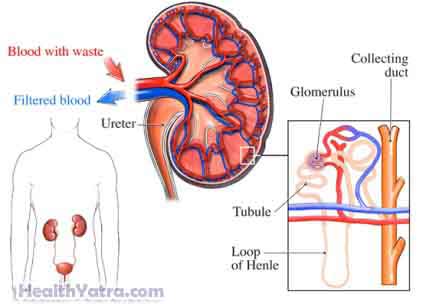परिभाषा
Kidney infections may occur in one or both kidneys. The kidneys remove waste from the body through urine. They also balance the water and mineral content in the blood. An infection may prevent them from working properly.

का कारण बनता है
Kidney infections are caused by a bacteria. The specific type of bacteria can vary. The bacteria most often comes from an untreated bladder infection.
जोखिम कारक
Bacteria may be introduced to the urinary tract and ultimately the kidneys by:
- यौन क्रिया
- Conditions that block or slow the flow of urine such as:
- ट्यूमर
- Enlarged prostate gland
- गुर्दे की पथरी
- Birth defect of the urinary tract, including vesicoureteral reflux
- Having a cystoscopy —a test to examine the bladder
- Catheter or stent placed in the urinary tract
- Conditions that impair bladder emptying like multiple sclerosis and स्पाइना बिफिडा
Other medical conditions that increase your risk of infection include:
- गर्भावस्था
- मधुमेह
- Polycystic kidneys
- दरांती कोशिका अरक्तता
- Previous kidney transplant
- Weakened immune system
लक्षण
Symptoms of kidney infection may include:
- Pain in the abdomen, lower back, side, or groin
- जल्दी पेशाब आना
- Urgent urination that produces only a small amount of urine
- Sensation of a full bladder—even after urination
- Burning pain with urination
- बुखार और ठंड लगना
- समुद्री बीमारी और उल्टी
- Pus and blood in the urine
- भूख में कमी
निदान
Your doctor will ask about your symptoms and medical history. A physical exam will be done. A kidney infection is diagnosed with urine tests . The urine is examined for:
- Bacteria or other signs of infection
- खून
- Protein
- Other abnormal elements
You may need further tests if the infection does not go away with treatment or if you have had several infections. These tests will be done to see if there are problems with the kidney, ureters, and bladder. Images of these structures can be taken by:
- Kidney ultrasound
- पेट का सीटी स्कैन
- एक्स-रे
- एमआरआई
उपचार
If the infection is not treated correctly or is left untreated, kidney infection can lead to:
- Sepsis (infection that has spread throughout the body)
- Chronic infection
- Scarring of the kidney
- Permanent kidney damage
You will be treated with antibiotics. Be sure to take all of the medication. Antibiotics may need to be delivered through an IV. This may require a stay in the hospital.
If you are diagnosed with a kidney infection, follow your doctor’s instructions .
रोकथाम
Since kidney infection is often a complication of a bladder infection. You can prevent bladder infections if you:
- Drink plenty of fluids throughout the day. Cranberry juice is a good choice to prevent bladder infection.
- Practice good hygiene.
- Urinate when you need to. Don’t wait.
- Take showers rather than baths.
- For women:
- Wipe from the front to the back after using the toilet.
- Urinate before and after sex. Drink water to help flush bacteria.
- Avoid genital deodorant sprays and douches.
